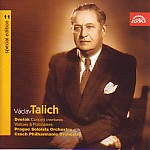Disagreeing with Vaclav Talich over a Dvorák performance is like taking the composer himself to task, but the fact is that the illustrious Czech conductor delivers a surprisingly stiff, unsmiling performance of In Nature’s Realm. The timings tell it all: 15:44 for Talich against about 14 minutes for Kubelik and Pesek, and a bit less for Kertesz. At this speed, the music acquires a stop-and-go quality at odds with its otherwise breezy content and triple-time rhythmic swing. Carnival is better: I still prefer slightly more abandon in the outer sections, but sharp rhythms and a gorgeous central interlude carry the day. Where Talich really cuts loose is in Othello. Although the timing here suggests another slow performance, the turbulent sections have splendid sweep and passion. The extra time is used to great effect in the gentler episodes, making for a reading of high contrasts and gripping romantic ardor (and once again driving home the point that the details of interpretation often can’t be measured in mere minutes and seconds).
The two Waltzes for string orchestra are, as you might expect, very well done (and very pretty they are, too), while the two polonaises make for a rousing conclusion. You also get a bonus in the form of earlier versions of the two waltzes, which along with the recordings of the polonaises date from ca. 1940. They sound surprisingly good, all things considered. Indeed, In Nature’s Realm, from 1949, is the most limited (and noisy) of the pieces included here. Everything else dates from the early 1950s and features good, clear mono sound that has been sensitively freshened.
Throughout this period Talich was being tormented by a former critic who actually arranged for him to be imprisoned under the new communist regime as an accused Nazi collaborator. After he was released, he was largely forbidden to conduct the Czech Philharmonic in public (his nemesis had since become Minister of Education and made sure of that), so it’s something of a miracle that we have these recordings at all. It’s also not surprising that in 1949, when his personal fortunes were at an all-time low, this version of In Nature’s Realm finds him in less than top form. Of course, this is all speculation, and the musical facts speak for themselves. Although this turns out to be a rather mixed bag, I know that collectors will want this even if there are numerous other releases in Supraphon’s Talich series that represent the conductor at his absolute best.
































